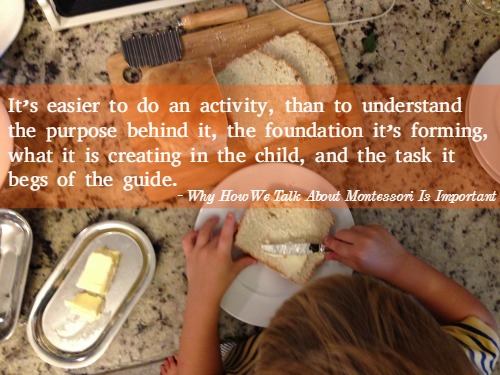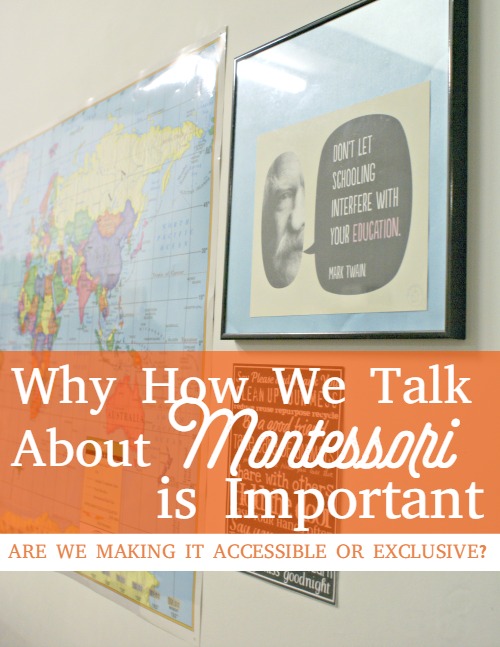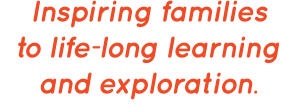Can I tell you something? One of my goals about writing and sharing Montessori ideas and philosophy is to do it in an accessible, life-giving way. Montessori is a wonderful philosophy of education, but it often gets a “better than thou” rapt because it’s a world all its own with jargon and books and particular ways (some may say obsessive compulsive) that don’t always make sense at first glance.
Reading Montessori’s books are not always easy to comprehend. She tends to jump around, goes off on pages of tangents, and there’s not a particular order to read her books, later texts seem to contradict earlier texts and she borrows much from her own work it can be confusing, perhaps even redundant.
But let’s be honest. Oftentimes the way Montessori teachers, bloggers, and aficionados talk about Montessori is no better, off putting even. We throw out words like normalization and control of error along with scope and sequence and didactic materials, the importance of the 3-period lesson, and the proper use or placement of materials. (There is purpose and reason for all these things. I’m not saying to throw them out, but how we talk about and convey them is important.)
We say we want to make Montessori accessible, but our practice puts a greater distance between our understanding of the philosophy and sharing it. We all want to get it right, but how much are we actually getting right?
I’ve been struggling a bit as I write the Montessori 101 series. I don’t know everything. There’s still so much for me to learn and much I haven’t looked at in years. Writing about sensitive periods and the absorbent mind has drummed up another set of fear in me–fear of getting it wrong, fear of not being “Montessori enough.” But with terms like spiritual embryo and psychic learning how is that helping?
There is so much depth to Montessori’s teachings, but if we only regurgitate her words then we’re not helping ourselves or others understand the concepts any better. Quotes are great, rephrasing the text is fine, but is it really comprehension? That’s where I struggle.
I think that’s why so many of us would rather focus on sequence of activities and extensions or why people ask, “Just tell me what to do next” rather than sit down and dive into the why and how of Montessori’s teachings. It’s easier to do an activity, than to understand the purpose behind it, the foundation it’s forming, what it is creating in the child, and the task it begs of the guide.
 How well do we understand Montessori philosophy? Could we give an elevator pitch on the Montessori topic at hand to a 5th grader? To someone with English as their second language? To a tired mom wrangling two little kids trying to figure out how she’s going to survive the day? Sure, we may know Montessori’s terminology, but if we can’t explain it in a way that helps and aids those around us, then we don’t know it.
How well do we understand Montessori philosophy? Could we give an elevator pitch on the Montessori topic at hand to a 5th grader? To someone with English as their second language? To a tired mom wrangling two little kids trying to figure out how she’s going to survive the day? Sure, we may know Montessori’s terminology, but if we can’t explain it in a way that helps and aids those around us, then we don’t know it.
I know that sounds harsh, but it’s something I feel convicted of. If I know of a method of education, a way of life really, that opens up the world to a child and frees them, in turn freeing the parents and building a better society, but can only explain it by quotes and references to old texts, then do I really know it? Am I really helping? Is Montessori really accessible…is it for everyone?
Montessori’s philosophy and methods is equally fascinating and overwhelming. It’s an awesome tool for opening up the world to the child and giving them the reins to not only their education, but their own becoming. I really do believe that.
I want to do it justice, but I want to share Montessori in a way that releases children, parents, teachers, and whole families to freedom, not a task list with a ruler to measure their progress and scales to weigh how true they are to Montessori.
If Montessori is of any use it will not enslave, but free.































6 comments… add one
I completely agree with you! I have just started a parent focused support company, using play groups as my base to build relationships and support the development of basic Montessori principles. I always begin by describing the Montessori method as a method which views children as capable and independent learners from birth. All they need is the right environment and that is the adults job.
so true so true so true…;)
I just had a new parent meeting tonight. The interest and questions were thoughtful, and the parents enjoyed hearing the whys to the ways. I believe if a teacher is passionate, extremely knowledgable and clearly loves the Montessori life she leads in the class, the method becomes understandable to the family. The child is a happy, explorative and curious being that is blooming. I always thought the Montessori lingo was more for staff meetings. I do remember Liz hall telling us never to say things like psychic deviations and normization to a group of parents.:). Hope I’m not too wordy, but the way Montessori is puris hung now, I am proud to have been at it these past 40 yrs. keep up your good works:)
I totally agree with you!! This has been in my head for a while — the fact that when I write blog posts, I cannot write about Montessori in layman terms. It takes time but this is going to be a goal of mine on my blog. Thank you for articulating what I’ve been feeling!!
Love this article, thank you 🙂
Especially this part : “Could we give an elevator pitch on the Montessori topic at hand to a 5th grader? To someone with English as their second language? To a tired mom wrangling two little kids trying to figure out how she’s going to survive the day?”
I assume we will learn until we die, but there are some principles we must try to talk about them in a simply way. 🙂
I spent half of my Montessori time trying to dig deeper and deeper, and spent the other half explaining to non montessorian (teachers, parents, students…) and your article reminds me something : the orangutan test :
“If I have some new ideas and I go into a room with an orangutan to explain them , the orangutan will simply sit there and eat its banana. I will come out of the room, however, knowing more than I did before. » (p.239) Deanna Kuhn (2001)
(I’m not saying that non montessorian people are monkeys ! 😉 )
Anyway, Montessori is a perpetual struggle between the real, true understanding of what she said, what she meant, what we understand, what we deducte, what we read between the lines and the way what we try to transmit all of that. 🙂
Never forget that “A journey of a thousand miles begins with a single step.” (Lao Tseu) so even if we simplify, we have to. We all learn counting from 1 to ten before we learn about fraction, logarithm, function and so on 🙂
PS : Einstein said : “If you can’t explain it simply, you don’t understand it well enough” 😀
As a parent trying to incorporate Montessori in my home without a school or any training I appreciate your words! I’ve taken a lot of guidance from Montessori bloggers and online groups but I still feel (and see in others) a lot of confusion about the basic concepts and how they’re typically described. I’ve also sensed a bit of fear (or maybe a stigma) among parents about not being “Montessori enough” and admitting that they still use plastic toys and sippy cups or let their kids play with their iphone. Regardless, I’m glad to be in the internet age where I have access to the vast amount of information available!